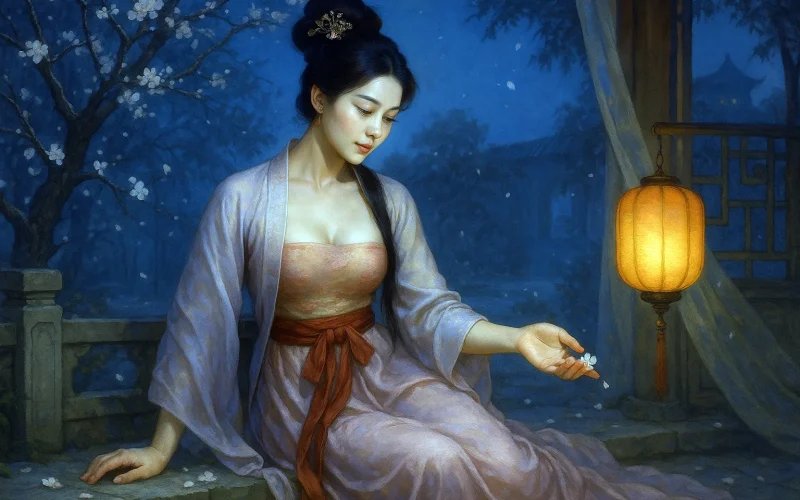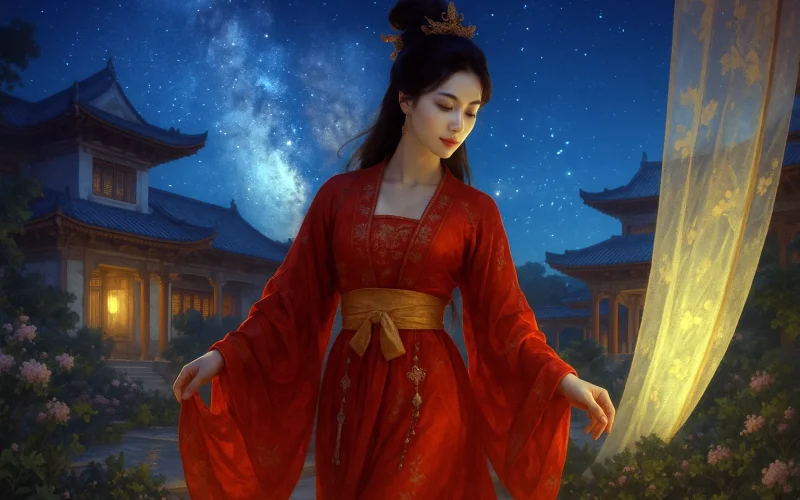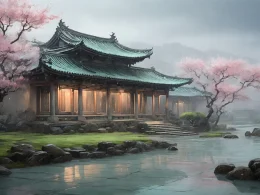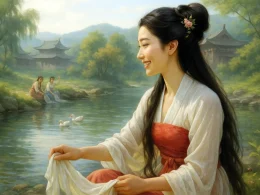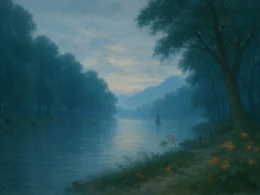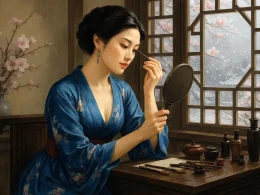Setting boat afloat where woods and ponds night embrace,
Insects chirp midst rustling rushes' whispering grace.
All shadows are cast by the moon's pure light,
All sounds are autumn's own music in the night.
The year fades in vain as late autumn's here,
Homesickness bears sorrow too heavy to bear.
Beyond northwest clouds that float and part,
Where does Yi River flow from the heart?
Original Poem
「秋夜泛舟」
刘方平
林塘夜发舟,虫响荻飕飕。
万影皆因月,千声各为秋。
岁华空复晚,乡思不堪愁。
西北浮云外,伊川何处流。
Interpretation
In his early years, Liu Fangping lived in reclusion in the countryside before entering officialdom, where his career did not flourish. His poetry often depicts mountain and pastoral scenes, romantic regrets, parting sorrows, and the reflections of a traveler. This poem was likely composed during a period of leisure or while journeying afar. Boating on a forested pond on an autumn night, the poet was moved by the scene to express his feelings. During the mid-Tang era, with regional separatist regimes and frequent wars, many scholars experienced a sense of restlessness and instability. In the quiet autumn night, through the moonlight, insect sounds, and flowing river, Liu Fangping conveys his lament over the passage of time and his deep longing for his hometown.
First Couplet: "林塘夜发舟,虫响荻飕飕。"
Lín táng yè fā zhōu, chóng xiǎng dí sōusōu.
At night, I set boat forth on a wooded pond;
Insects chirp, reeds rustle in the breeze.
The opening lines establish the time and setting, creating a tranquil atmosphere for the autumn night boat ride. The sounds of insects and rustling reeds form the background chorus, evoking a cool environment and symbolizing solitude and loneliness.
Second Couplet: "万影皆因月,千声各为秋。"
Wàn yǐng jiē yīn yuè, qiān shēng gè wèi qiū.
All shadows are cast by the moon,
Every sound speaks of autumn.
This couplet shifts to depict the scenery. The bright moonlight creates countless shadows; the chorus of insects, wind, and reeds forms the "thousand sounds," each carrying the cool and wistful essence of autumn. The poet condenses the natural world into two core images—"moon" and "autumn"—demonstrating remarkable conciseness.
Third Couplet: "岁华空复晚,乡思不堪愁。"
Suìhuá kōng fù wǎn, xiāngsī bùkān chóu.
In vain the years have passed, bringing late twilight;
Homesickness brings unbearable sorrow.
Emotion arises from the scenery, turning into personal reflection. "In vain the years have passed" (岁华空复晚 suìhuá kōng fù wǎn) implies a sense of unfulfilled talent and misspent youth, while "homesickness" (乡思 xiāngsī) directly points to the anguish of life away from home.
Fourth Couplet: "西北浮云外,伊川何处流。"
Xīběi fúyún wài, Yīchuān hé chù liú.
Beyond the floating clouds in the northwest,
Where does the Yichuan River flow?
The poem concludes with a rhetorical question, directing thoughts toward the distant hometown. "Floating clouds" (浮云 fúyún) symbolize separation, and "Yichuan" (伊川 Yīchuān) signifies the poet’s native place. Gazing into the distance, filled with longing yet unable to return, the poet pours his emotions into the flowing river, ending the poem with subtle depth.
Holistic Appreciation
Set against the backdrop of a night boat ride in autumn, the poem unfolds layer by layer: the first two couplets describe the scenery, creating a cool, beautiful, and lonely atmosphere; the latter two transition into emotion, directly expressing the sorrow of time’s passage and uncontrollable homesickness. Scene and feeling are closely intertwined, creating a profound and serene mood. Liu Fangping excels at using concise language to create vivid imagery: for example, "insects chirp, reeds rustle" appeals to both auditory and visual senses, while "all shadows are cast by the moon, every sound speaks of autumn" is highly condensed, capturing the ethereal and deep qualities of an autumn night. Using the image of a small boat adrift, the poet conveys a sense of rootlessness in life. Though expressing personal emotion, the poem reflects the widespread loss and melancholy among scholars in the tumultuous mid-Tang society.
Artistic Merits
- Scene and emotion blended, natural transition: The first half depicts scenery, the second expresses emotion; feeling arises from the scene, forming a complete structure moving from stillness to motion and from scene to emotion.
- Cool imagery, rich symbolism: The moon, insects, reeds, boat, floating clouds, and river create a lonely atmosphere, symbolizing life’s wandering, the unpredictability of worldly affairs, and the inability to return home.
- Concise language, parallel structure: Lines like "all shadows are cast by the moon, every sound speaks of autumn" are neat and concise, with profound meaning, demonstrating high poetic skill.
- Melodious rhythm, serene tone: The poem uses the five-character regulated form, with harmonious syllables and a slow rhythm, creating a quiet and subtle tone that leaves a lasting impression.
Insights
Life often involves wandering and loneliness, like a small boat floating on a forested pond on an autumn night. Faced with the passage of years and the weight of homesickness, the poet does not cry out directly but conveys inner feelings through natural imagery. This teaches us that in reality, we can also comfort our hearts by embracing nature and reflecting on landscapes, using serene environments to settle our emotions and find peace with ourselves. At the same time, it reminds us to cherish time, avoid vain pursuits, and confront the uncertainties and transience of life.
About the Poet
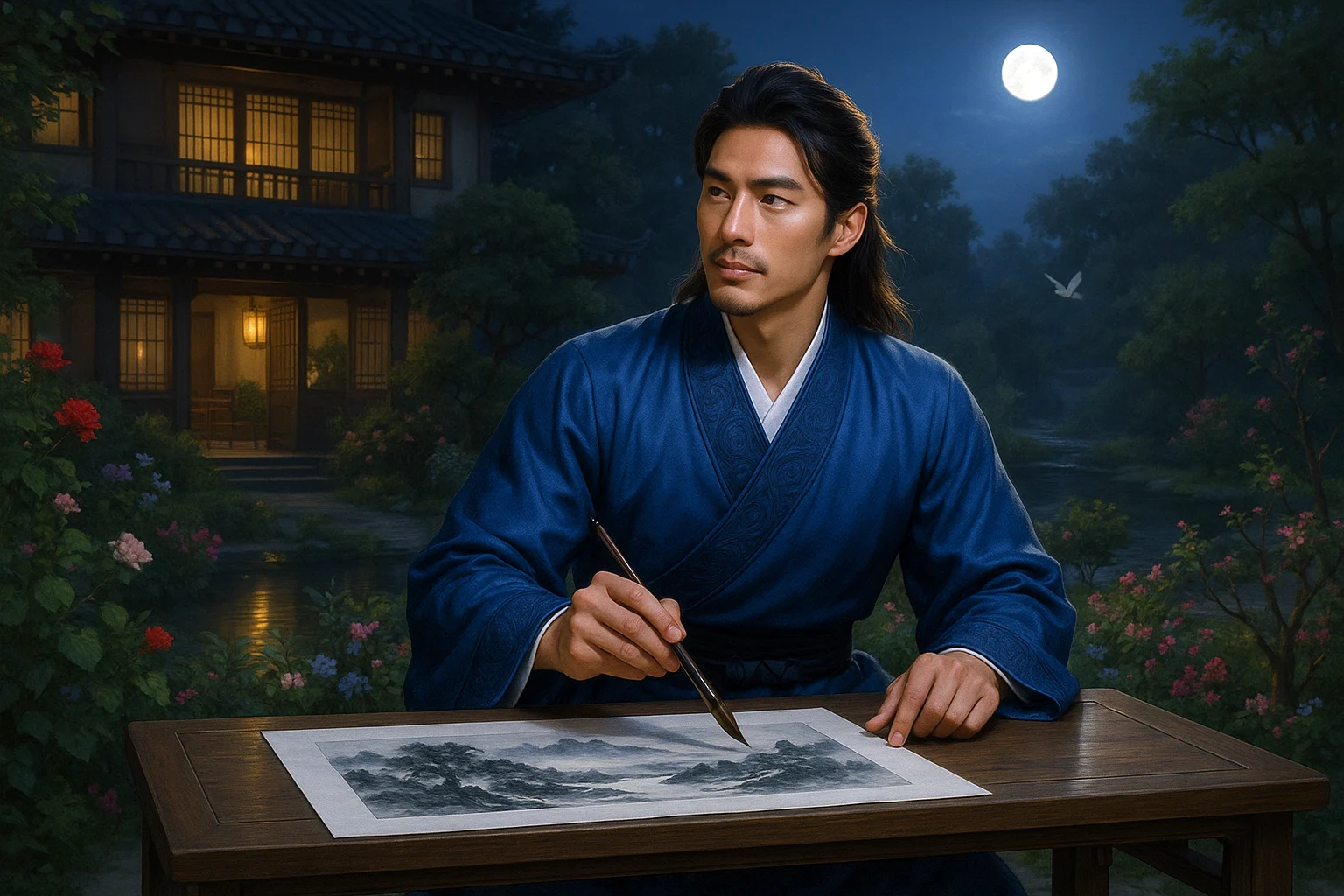
Liu Fangping (刘方平 c. 742 – c. 785), a native of Luoyang in Henan. A recluse-poet and painter spanning the High to Mid-Tang period, he distinguished himself with a delicate and subtle poetic style skilled in depicting boudoir lament and moonlit nights. Though only 26 of his poems survive in the Complete Tang Poems, works like Moonlit Night and Spring Lament secured his place in the canonical hall of Tang poetry. Hailed as "the pure voice of the High Tang and the herald of the Mid-Tang," his poetry fused the lucidity of the Qi-Liang style with Zen serenity, profoundly influencing the later ci lyric tradition and Heian-era Japanese women's literature.







